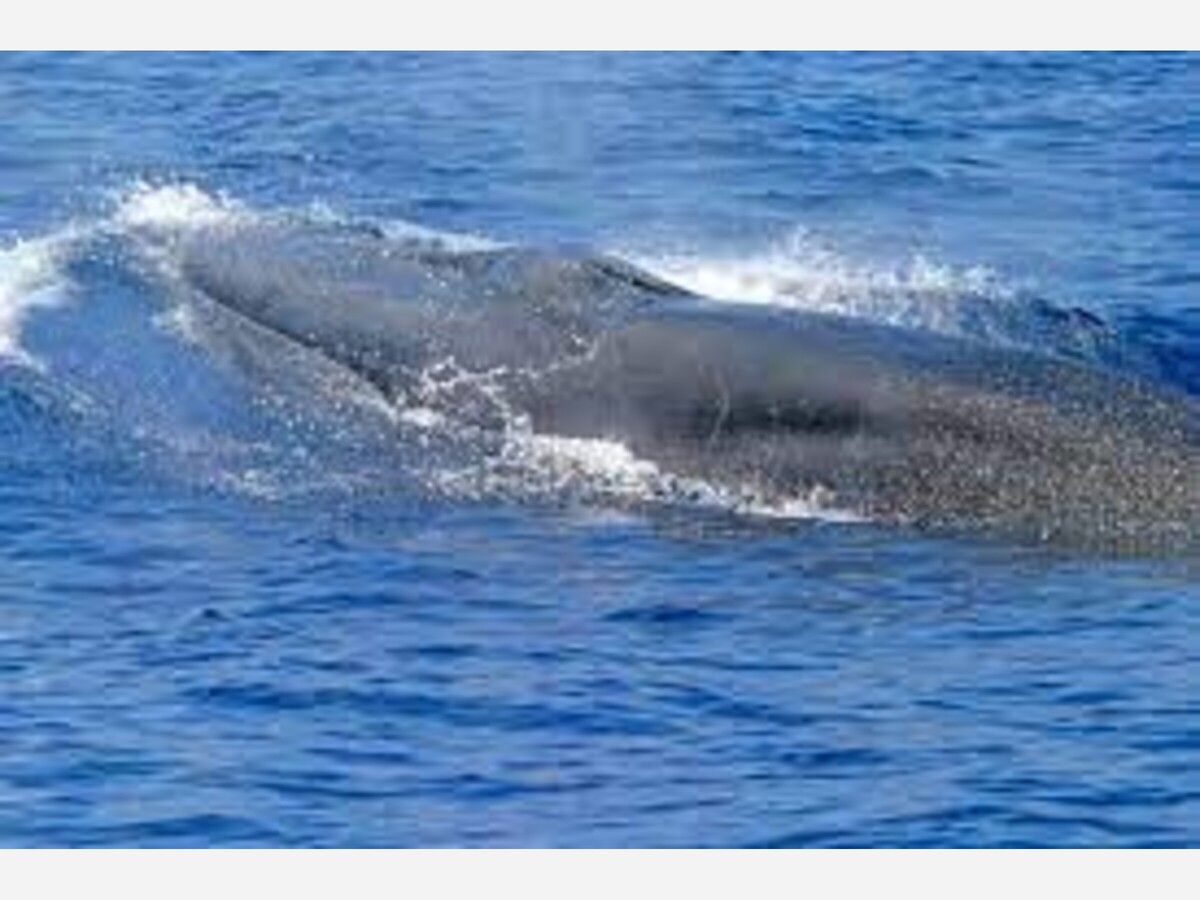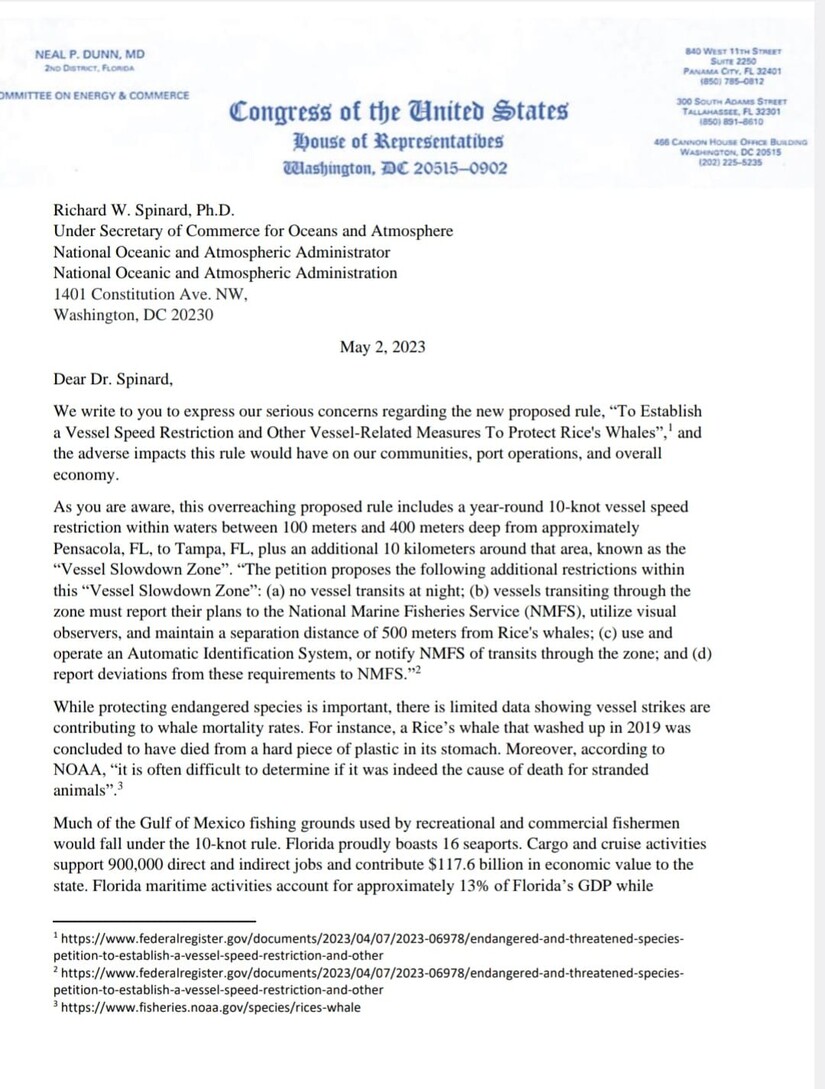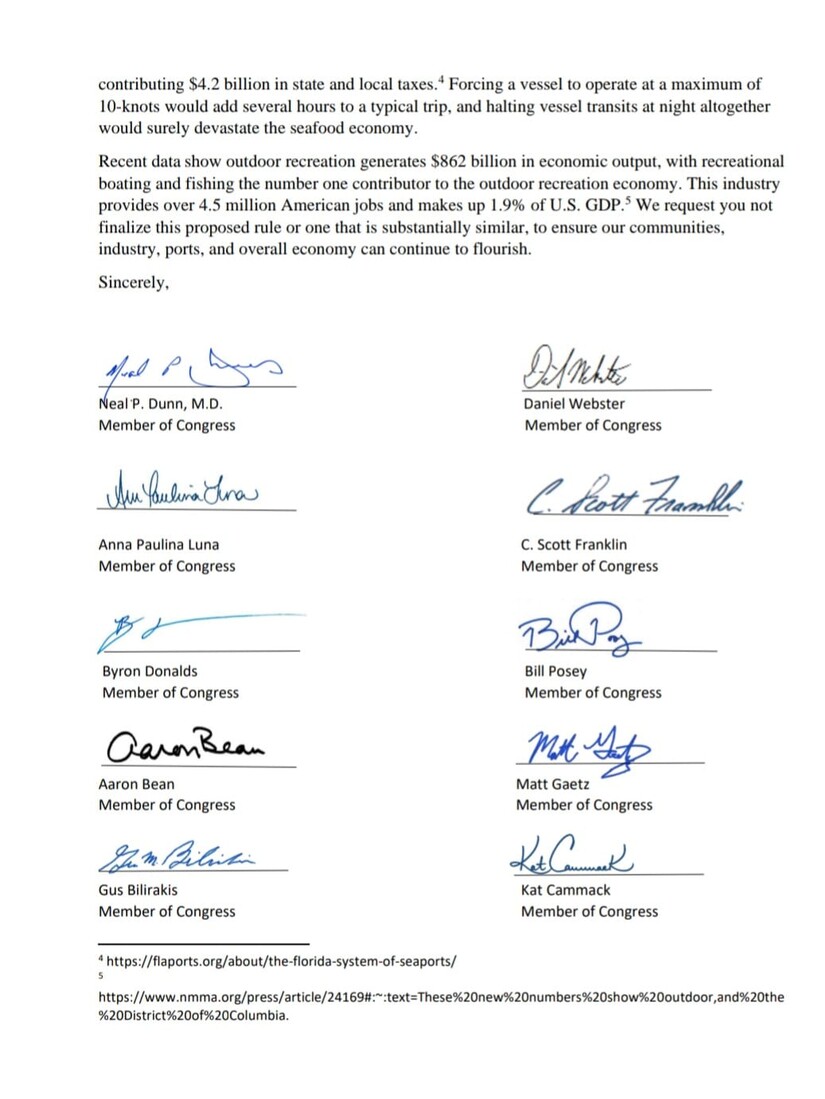Image


As your NOAA and National Weather Services Weather Ready Nation Ambassador for the Tampa Bay Area, Tidings Media (Tampa Bay, Florida) is contacting National Oceanic and Atmospheric Administration in opposition to their proposed vessel speed restriction. The changes would expand the current mandatory seasonal speed restrictions of 10 knots or less in designated areas of the ocean and extend to most vessels measuring 35 to 65 feet in length, making the changes year round in the Tampa Bay area.
Here's an updated link to a downloadable PDF from NOAA on the latest proposal, which is open for public comment but has of yet to be made an official rule :
https://www.regulations.gov/document/NOAA-NMFS-2023-0027-0001
The petition proposes a year-round 10-knot vessel speed restriction within waters between 100 meters (m) and 400 m deep from approximately Pensacola, FL, to just south of Tampa, FL ( i.e., from 87.5° W longitude to 27.5° N latitude) plus an additional 10 kilometers (km) around that area (referred to in the petition as the “Vessel Slowdown Zone”). The petition proposes the following additional restrictions within this “Vessel Slowdown Zone”: (a) no vessel transits at night; (b) vessels transiting through the zone must report their plans to NMFS, utilize visual observers, and maintain a separation distance of 500 m from Rice's whales; (c) use and operate an Automatic Identification System, or notify NMFS of transits through the zone; and (d) report deviations from these requirements to NMFS. The petitioners discuss the vulnerability of the species, identify vessel strikes and vessel noise as risks to the whales, and describe NMFS' authority under the ESA and MMPA to establish a “Vessel Slowdown Zone” with regulations. The petition describes the features of a “Vessel Slowdown Zone” and asserts that the petitioned vessel-related mitigation measures are necessary for the conservation and recovery of Rice's whales.
While there's no conclusive study that says that the proposed rule for the Gulf of Mexico would make a positive impact on the North Atlantic Whale species, there is no doubt the economic impact that such a shutdown would have on local fishermen and recreational boaters, causing an economic disaster on a hunch that it may "save the whales." It's worth pointing out that whales are almost never seen in the waters the restriction intends to impose in the Tampa Bay area. The issue might be more appropriately focused on the Atlantic side of Florida where the whales frequent, not the Gulf Coast in which whale sightings below the targeted depths are rare to never. You're proposing a solution to a problem that doesn't exist in the shallows of the Tampa Bay region.
Conservation efforts play a crucial role in safeguarding our marine ecosystems, ensuring the sustainability of marine species, and maintaining a healthy oceanic environment. The National Oceanic and Atmospheric Administration (NOAA) is at the forefront of such efforts, continually proposing measures to protect marine life. However, there are instances where their proposed regulations may impede economic activities without delivering proportional conservation benefits. In the case of NOAA's suggested vessel speed restrictions, it is crucial to critically evaluate their impact and seek alternative solutions that balance conservation goals with economic realities.
The Need for Conservation
There is no denying the importance of conservation efforts, particularly when it comes to protecting vulnerable marine species. Collisions between vessels and marine animals can have devastating consequences, leading to injury, death, or habitat disruption. It is essential to find effective solutions to mitigate such impacts while ensuring the long-term survival of marine ecosystems.
The Case Against Vessel Speed Restrictions
While acknowledging the genuine concern behind NOAA's proposed vessel speed restrictions, there are valid reasons to question the effectiveness and feasibility of such measures. Here are a few key points to consider:
Finding a Balanced Approach
Balancing conservation and economic concerns is not an easy task, but it is essential to strive for solutions that work for both parties. NOAA should engage in collaborative discussions with stakeholders from the maritime industry, conservation organizations, and scientific experts to develop comprehensive strategies that address the root causes of marine species endangerment while minimizing negative economic impacts.
Conservation efforts are critical for preserving our marine ecosystems, but it is essential to carefully evaluate the proposed regulations to ensure their effectiveness and feasibility. While NOAA's proposed vessel speed restrictions aim to protect marine species, alternative approaches that address the broader challenges faced by these species should be considered. Collaborative efforts, innovative technology, and industry best practices can provide a more balanced approach to achieving conservation goals without disproportionately burdening the maritime industry. By finding common ground, we can safeguard our marine ecosystems while supporting sustainable economic activities.
As your Ambassador for the Tampa Bay Area Weather Ready Nation initiative, we strongly urge you to work with our local governing agencies including the Florida Fish and Wildlife Conservation Commission to come up with a strategy for conservation efforts that do not include adverse speculative economic impacts until and unless it can be demonstrated that such restrictive measures have a tangible, predictable and meaningful impact on the desired goal we all have, which is to save the whales.
David Happe, Tidings Editor and NOAA Weather Ready Nation Ambassador

